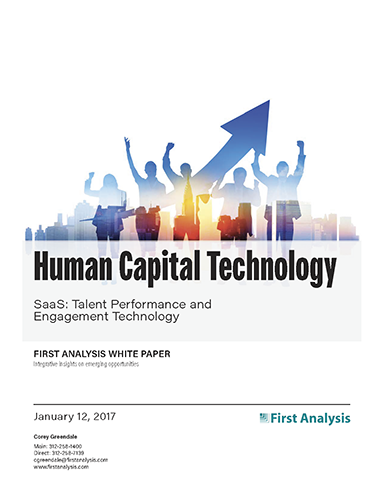White paper: Human capital technology
Talent performance and engagement technology: Engaging and driving the modern workforce

Building on our work in Human Capital Technology, this white paper provides a deep dive into the world of performance management and employee engagement, analyzing the economic, demographic, and technology drivers underpinning rapid evolution in approaches and solutions and profiling selected companies we believe are well positioned to be category leaders.
Employers increasingly view performance management and employee engagement as top priorities while rethinking traditional approaches, catalyzed by a challenging labor market characterized by employees increasingly willing to leave unengaging jobs and by technologies that transform performance management from a dreaded, once-per-year art, subject to significant bias, to a data-driven, just-in-time science.
Increasing recognition of the importance of workplace culture and engagement, combined with the prevalent view of most employers that they are underprepared to address these areas, suggests a growth scenario for providers of user-friendly technologies that allow employers to empower and receive feedback from their employees, align individual goals with company-wide objectives, and better motivate and engage workers.
In combination with the technologies and companies we discussed in our earlier Talent Acquisition & Analytics and Talent Development white papers, we view the providers profiled in this report as essential elements of a holistic talent technology ecosystem that allows employers to maximize the value generated from their investments in people: a critical source of sustainable competitive advantage.
TABLE OF CONTENTS
Includes profiles of 52 public and private companies
- Industry drivers
- Performance management solutions
- Featured company profiles: performance management solutions
- Sales performance management/incentive compensation technology
- Featured company profiles: sales performance management/incentive compensation technology
- Employee engagement technology
- Featured company profiles: employee engagement
Introduction
A significant evolution in employee performance management is underway as companies increasingly view the discipline as a top priority while rethinking traditional approaches. This focus is galvanized by economic factors, including historically slow worker productivity growth, with 1.1% average annual growth since the end of the 2008-2009 recession falling below the 2.1% average seen since the beginning of the postwar period. Additionally, labor costs have grown ahead of productivity gains, pressuring employers to find ways to improve the ROI on their talent.
Against this economic backdrop, employers are facing both cyclical and secular labor market challenges, including tighter availability of skilled workers, illustrated by the current measure of unemployed workers per job opening being at the lowest levels since the pre-recession period and the willingness of younger employees to change jobs relatively frequently if they don’t feel their employers are actively engaging them and investing in their career development.
Given these trends, senior executives and HR departments are increasingly aware of the need to reformulate their approaches to engaging and motivating talent. Technology can play a key role in filling this need, with modern performance management programs, enabled by a new generation of cutting-edge technology solutions, a critical driver of company-aligned employee performance, engagement, and retention.
We believe a meaningful shift in talent performance management is underway. Employers are deploying new technology that moves beyond the simple process automation provided by legacy solutions toward functionality that empowers and improves the professional lives of employees and better aligns employee behavior with broader company goals. In tandem, employers are adopting new management philosophies reflecting the evolving nature of organizational structure, with teams often assembled on a just-in-time basis to work toward specific goals rather than consisting of static groups that always report to the same manager.
This shift creates the need for tools that facilitate continuous feedback from a wider array of stakeholders, augmenting or replacing traditional annual one-on-one performance reviews. This has led to the reinvention of performance management and measurement through a more versatile approach built around frequent employee feedback on both an employee-manager and peer-to-peer basis, shared goals that are determined collaboratively and made transparent to the entire team, and regular career development-related communication.
We believe this new philosophy is increasingly prevalent among corporate leaders and reflects a building consensus that talent needs to be a sustainable source of competitive advantage. It also reflects the challenges employers face in recruiting, retaining, and leveraging top-quality talent. These trends require a shift to a data-driven approach that is sharply focused on employee development and morale-building, rendering obsolete many legacy HR tools that were designed for use solely by HR personnel rather than by all employees and are largely transactional.
Managers are more aware than ever of the importance of a high-performance culture, cultivated by empowering and prioritizing the needs of workers and ensuring employees clearly see the tie between their individual success and the entire organization’s goals. This awareness is reflected in the Deloitte University Press Global Human Capital Trends 2016 survey of over 7,000 business and HR leaders from around the globe in which 86% of respondents identified culture and 85% identified employee engagement as a very important or important human capital focus areas within their business.
We believe these factors, as well as additional trends discussed in this report, are creating compelling market opportunities for a new generation of software providers offering solutions that make performance management more data-driven and efficient while lowering barriers to employee access and utilization. In the past, companies employed annual performance reviews to inform promotion and compensation decisions and periodic employee surveys to measure work satisfaction and other elements of corporate culture. Each of these methods provides only a narrow, isolated snapshot of current conditions while offering limited actionable information. In stark contrast, newer solutions drive a value-creating performance management culture that is increasingly functioning as a key component of a broader culture of worker empowerment, leading to stronger individual performance, superior employee retention, and, ultimately, better corporate results.

Request full report
To access the full report, please provide your contact information in the form below. Thank you for your interest in First Analysis research.
